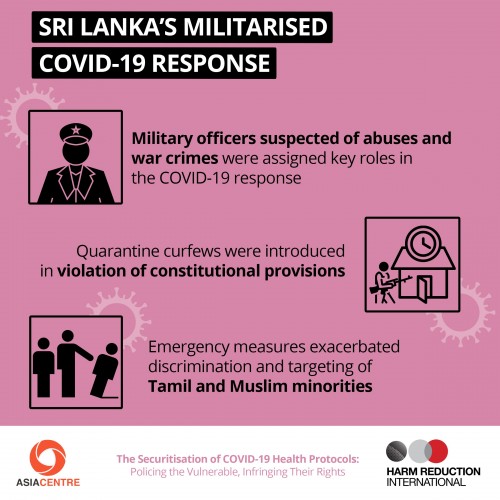The Securitisation of COVID-19 Health Protocols: Policing the Vulnerable, Infringing Their Rights
Punitive responses to COVID-19 by several governments in Asia, which relied excessively on law enforcement and the military, have resulted in serious human rights violations and have far been counter-productive in controlling the spread of COVID-19.
Governments misused emergency and executive powers to expand surveillance and criminalise vulnerable individuals and communities, putting in place COVID-19 protocols which were primarily aimed at controlling the population, rather than at safeguarding health and providing them with the support needed to abide by the newly introduced measures. The report, The Securitisation of COVID-19 Health Protocols: Policing the Vulnerable, Infringing their Rights, co-published by Asia Centre and Harm Reduction International in August 2021, found:
- In Malaysia, the pandemic was used as an excuse to deny entry to refugees and poor neighbourhoods inhabited by migrant workers and refugees were contained by barbed wire and patrolled by armed troops;
- In Sri Lanka, the military was given the power to impose curfews, set up checkpoints, arrest violators, run quarantine centres, and deter public gatherings and over 40,000 people were arrested for lockdown violations between March and April 2020 alone.
- In the Philippines, President Duterte ordered the police and the military to ‘shoot them dead,’ when referring to people violating quarantine rules and at least 3 people died following ill-treatment or use of lethal force in lockdown enforcement.
The disastrous impacts of punitive drug control on individual and community health have shown how punitive responses are ineffective ways to confront health issues. Securitised COVID-19 responses were equally ineffective in safeguarding the public from COVID-19.
On 9 September 2021, the eleventh panel of Asia Centre’s 6th International Conference ‘COVID-19 in Asia: Communication, Nationalism and Technology’ was organised by Harm Reduction International. The panel on ‘The Securitisation of COVID-19 Health Protocols: Policing the Vulnerable, Infringing their Rights’ comprised Dr. James Gomez, Regional Director of Asia Centre; Dr. Josh San Pedro, Co-convener of Coalition for People’s Right to Health (Philippines); Dr. Irma Hidayana, Co-founder of Lapor-Covid19 (Indonesia); Ms. Dhevy Sivaprakasam of AccessNow; and Dr. Hartini Zainudin, Co-founder of Yayasan Chow Kit, Malaysia. The moderator was Giada Girelli, Human Rights Analyst of Harm Reduction International.
Infographics on The Securitisation of COVID-19 Health Protocols:






Don't miss our events and publications
Subscribe to our newsletter